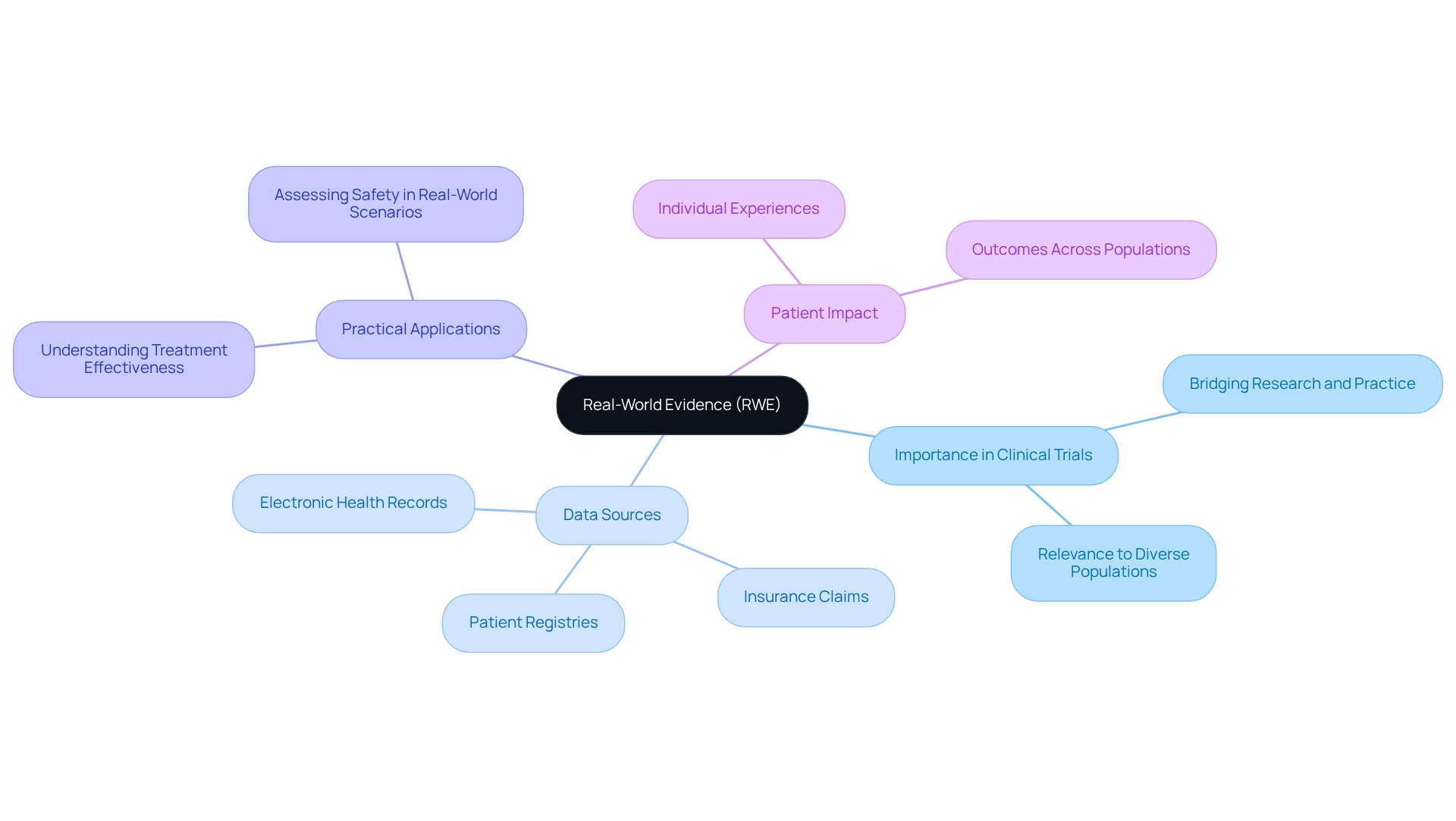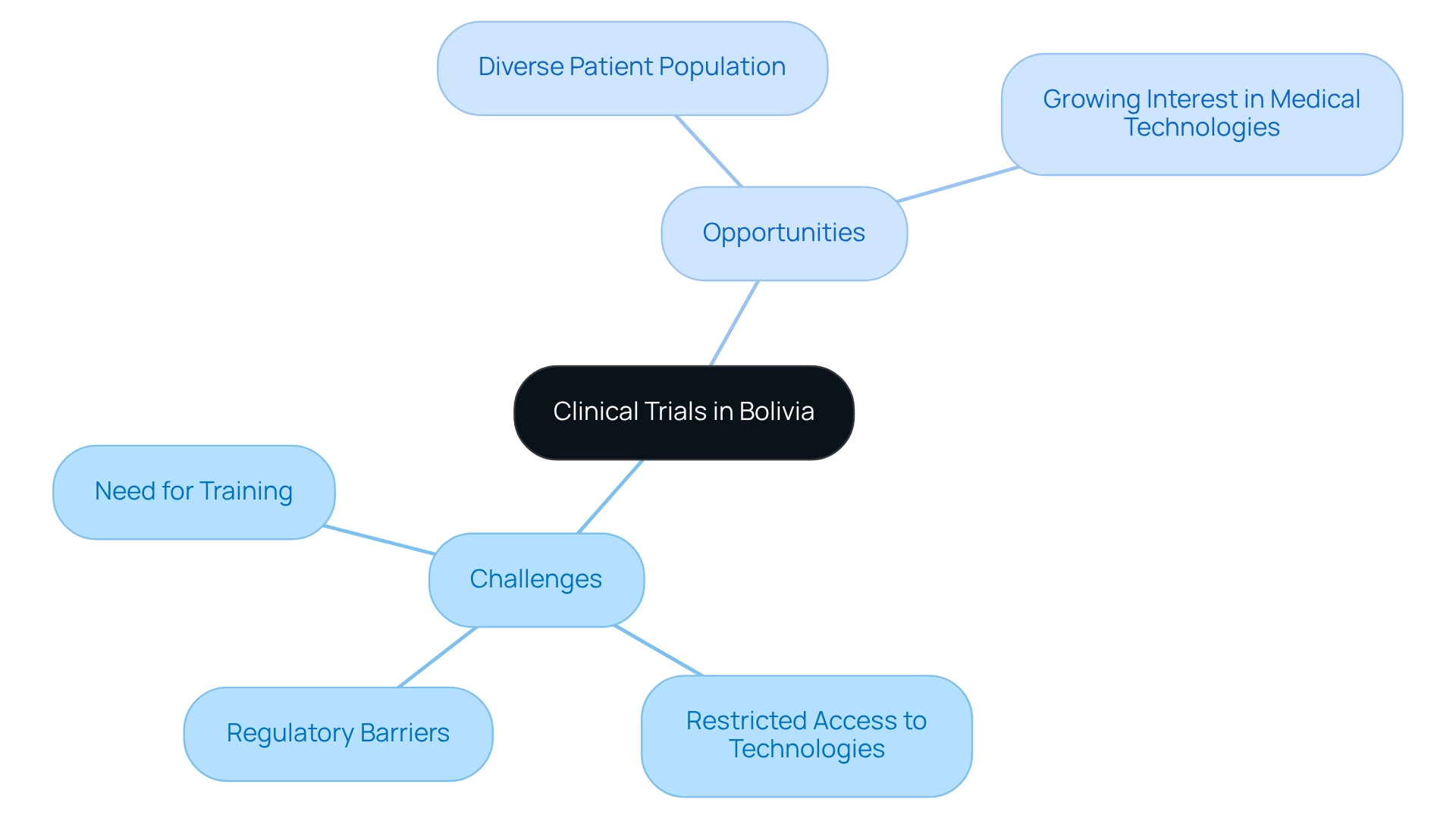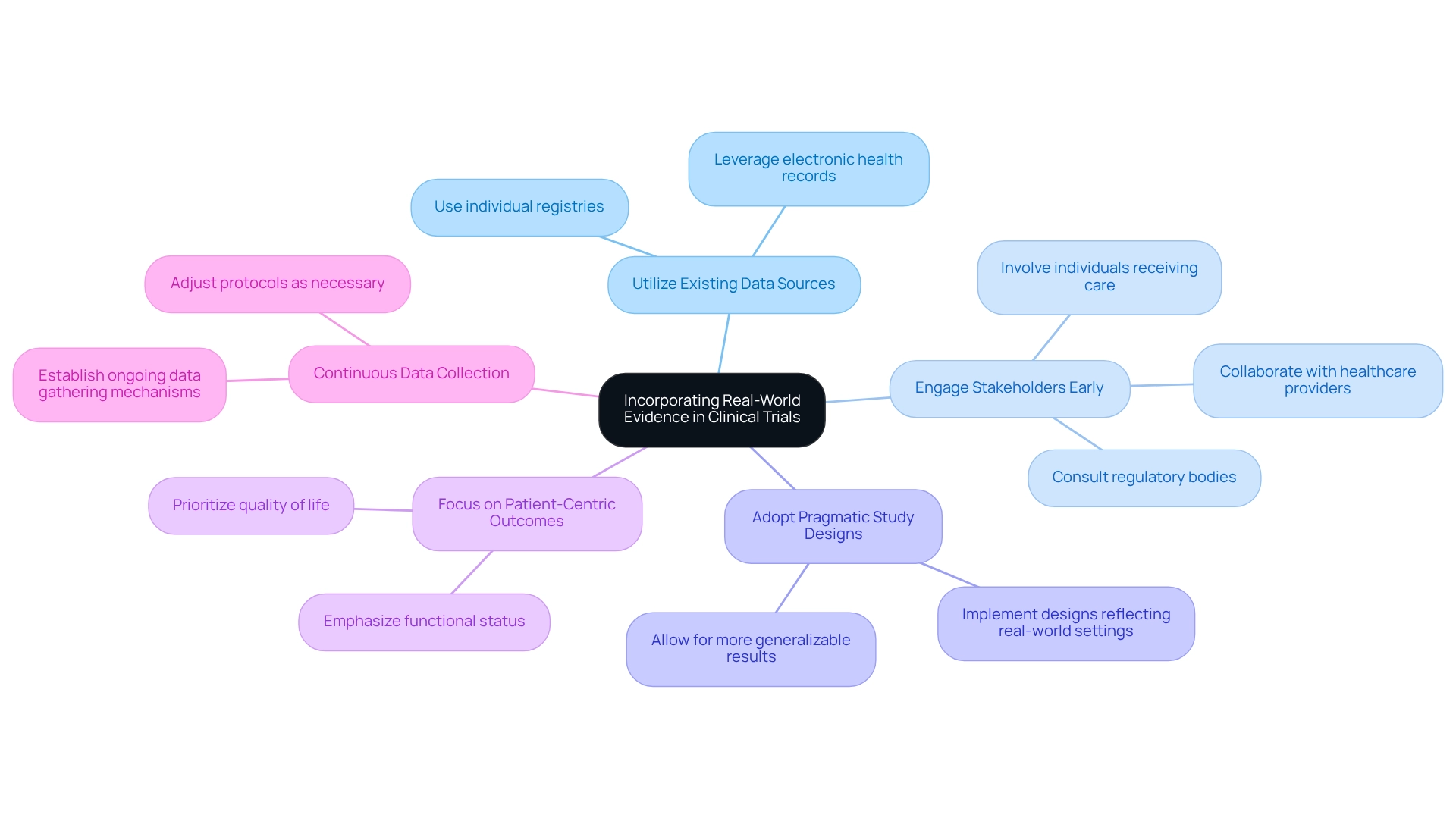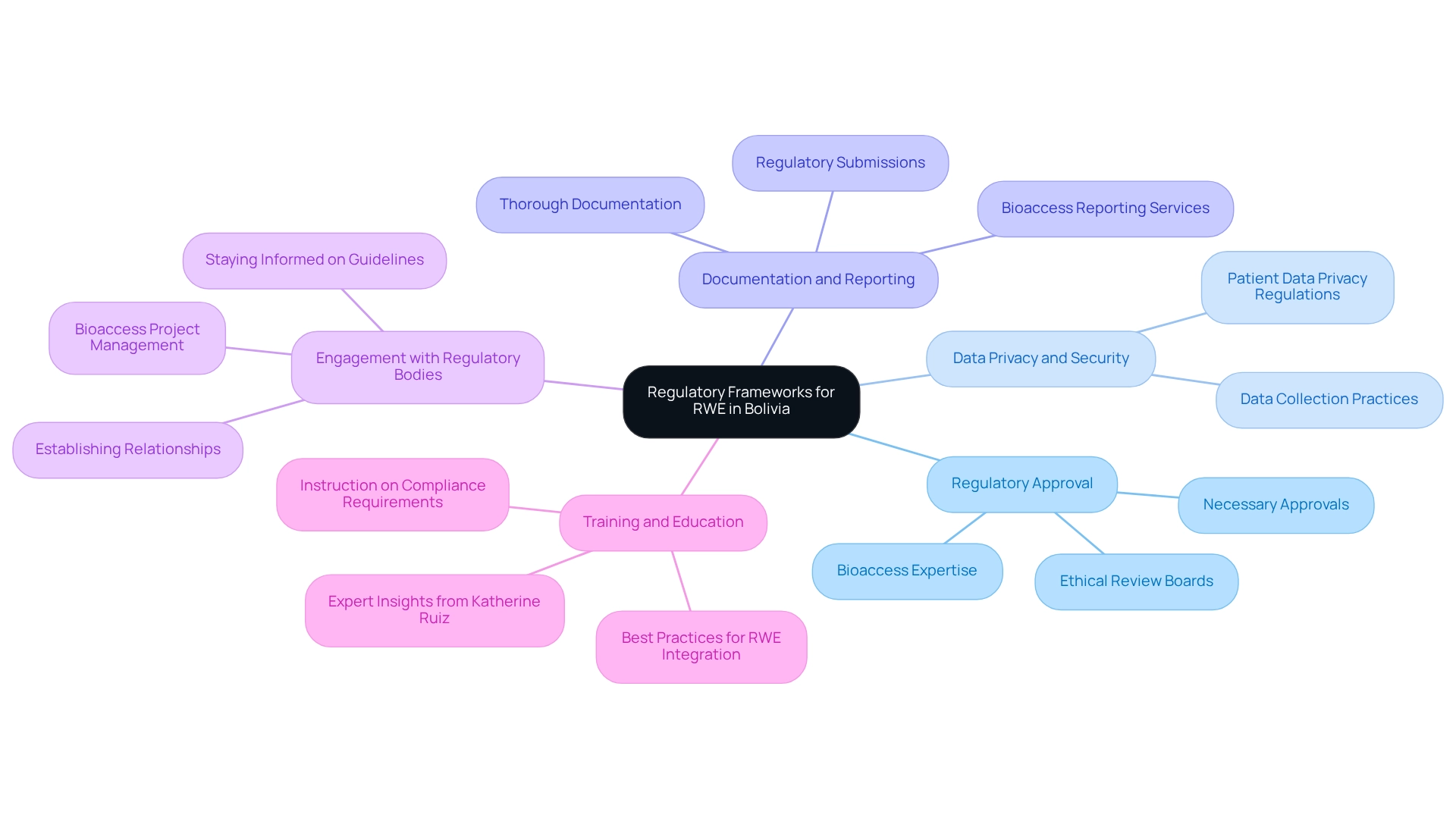Overview
Incorporating real-world evidence (RWE) in Bolivian clinical trials is essential for enhancing the relevance and applicability of research findings to everyday medical practices. This approach not only strengthens the credibility of clinical research but also aligns it closely with the actual experiences of patients. Strategies such as:
- Utilizing existing data sources
- Engaging stakeholders early
- Focusing on patient-centric outcomes
are pivotal. By ensuring that clinical research effectively reflects real-world experiences, we can significantly improve healthcare outcomes in Bolivia. The commitment to integrating RWE is a critical step towards advancing clinical practices and fostering a more responsive healthcare system.
Introduction
In the evolving landscape of clinical research, the integration of real-world evidence (RWE) has become increasingly vital. Traditional randomized controlled trials (RCTs) often struggle to capture the complexities of patient experiences, making RWE a key player that offers insights derived from data collected in everyday settings. This shift enhances the relevance of clinical findings and addresses the diverse needs of patient populations.
In Bolivia, the potential for RWE is accompanied by unique challenges and opportunities, underscoring the importance of strategic incorporation into clinical trial designs. By navigating regulatory frameworks and fostering collaboration among stakeholders, researchers can leverage RWE to improve healthcare outcomes and drive innovation in medical technology.
Define Real-World Evidence and Its Importance in Clinical Trials
Real-world evidence (RWE) is defined as the evidence derived from the analysis of real-world data (RWD), encompassing information collected beyond the confines of traditional randomized controlled trials (RCTs).
Real-world evidence in Bolivian clinical trials plays a pivotal role in research studies, offering profound insights into the functionality of medical products within everyday settings and reflecting individual experiences and outcomes across a broader population.
Real-world evidence in Bolivian clinical trials bridges the gap between medical research and practical application, ensuring that findings are relevant to diverse groups of individuals.
Real-world evidence in Bolivian clinical trials is derived from multiple data points, including electronic health records, insurance claims, and patient registries, making it an invaluable resource for understanding treatment effectiveness and safety in real-world scenarios.
At bioaccess®, we prioritize the safeguarding of your information throughout the research process.
Should you have any inquiries or concerns regarding the handling of your data, please contact our Grievance Officer at IMH ASSETS CORP (doing business as "bioaccess®"), located at 1200 Brickell Avenue, Suite 1950 #1034, or via email at info@bioaccessla.com.
We are committed to addressing your concerns in accordance with applicable law, as detailed in our Privacy Policy, ensuring compliance and transparency in our operations.

Explore the Landscape of Clinical Trials in Bolivia: Challenges and Opportunities
The landscape of medical trials in Bolivia presents both challenges and opportunities. The primary obstacles include:
- Regulatory barriers
- Restricted access to cutting-edge medical technologies
- A pressing need for enhanced awareness and training among local healthcare practitioners regarding research methodologies
However, Bolivia also offers unique opportunities, such as:
- A diverse patient population
- A growing interest in innovative medical technologies
With bioaccess®'s expertise in overseeing medical studies—including Early-Feasibility Studies, First-In-Human Studies, and Post-Market Medical Follow-Up Studies—the country's evolving regulatory framework can facilitate the incorporation of Real-World Evidence (RWE) into study designs. By leveraging local collaborations and understanding the socio-economic environment, researchers can significantly improve the viability and impact of medical studies in Bolivia, contributing to job creation, economic development, and enhanced healthcare.

Implement Strategies for Incorporating Real-World Evidence in Clinical Trial Design
Incorporating real-world evidence in Bolivian clinical trials into study design is crucial for enhancing the relevance and applicability of research findings. Several strategies can be employed to achieve this goal:
- Utilize Existing Data Sources: Leverage electronic health records and individual registries to gather relevant data that can inform study design and selection criteria.
- Engage Stakeholders Early: Collaborate with healthcare providers, individuals receiving care, and regulatory bodies during the planning phase to ensure that the study design addresses real-world concerns and needs.
- Adopt Pragmatic Study Designs: Implement pragmatic study designs that reflect real-world settings, allowing for more generalizable results.
- Focus on Patient-Centric Outcomes: Prioritize results that matter to patients, such as quality of life and functional status, to enhance the relevance of research findings.
- Continuous Data Collection: Establish mechanisms for ongoing data gathering throughout the study to capture real-world outcomes and adjust protocols as necessary.
By integrating these strategies, clinical research can better align with the complexities of real-world evidence in Bolivian clinical trials.

Understand Regulatory Frameworks and Compliance for RWE in Bolivia
Navigating the regulatory frameworks for Real-world evidence in Bolivian clinical trials requires a comprehensive understanding of the guidelines established by local health authorities.
-
Regulatory Approval is paramount; all clinical studies that rely on real-world evidence in Bolivian clinical trials must secure the necessary approvals from Bolivian health authorities, including ethical review boards. bioaccess offers specialized expertise in study setup and compliance evaluations to streamline this process.
-
Data Privacy and Security is another critical consideration. It is essential to adhere to regulations concerning patient data privacy, ensuring that all data collection and storage practices align with local laws.
-
Documentation and Reporting must be meticulously maintained. Thorough documentation of all sources and methodologies utilized in the study of Real-world evidence in Bolivian clinical trials is crucial for regulatory submissions. bioaccess provides comprehensive reporting services, which include detailed documentation and study status updates, to support this requirement.
-
Engagement with Regulatory Bodies is vital for success. Establishing and nurturing relationships with regulatory agencies allows for staying informed about evolving guidelines and facilitates smoother approval processes. bioaccess's project management services can effectively assist in maintaining these essential relationships.
-
Training and Education for research teams is imperative. Providing instruction on compliance requirements and best practices for integrating real-world evidence in Bolivian clinical trials into medical studies ensures that all team members are aligned with regulatory expectations. Katherine Ruiz, an expert in regulatory affairs for medical devices and in vitro diagnostics in Colombia, can offer valuable insights and training to enhance compliance efforts.
For further information on how bioaccess can support your clinical trial needs, please do not hesitate to reach out to us.

Conclusion
The integration of real-world evidence (RWE) into clinical trials signifies a transformative shift in research methodology, particularly within diverse settings such as Bolivia. By leveraging RWE, researchers can acquire profound insights into patient experiences and treatment efficacy in everyday contexts, effectively bridging the gap between clinical research and practical healthcare applications. This approach not only enhances the relevance of clinical findings but also ensures that they cater to the needs of diverse patient populations.
Despite the challenges presented by regulatory frameworks and existing healthcare infrastructure, Bolivia’s unique landscape offers substantial opportunities for innovation. By fostering collaboration among stakeholders and adopting strategic methodologies for incorporating RWE, researchers can adeptly navigate these complexities. The potential for RWE to inform trial designs and enhance healthcare outcomes is considerable, paving the way for advancements in medical technology that can benefit both patients and the healthcare system as a whole.
In conclusion, embracing real-world evidence is imperative for the future of clinical research in Bolivia. By prioritizing patient-centric outcomes and engaging with local healthcare professionals and regulatory bodies, the integration of RWE can yield more effective and applicable clinical trials. This not only contributes to improved health outcomes but also supports economic growth and job creation within the healthcare sector, underscoring the critical role of RWE in driving innovation and enhancing patient care.
Frequently Asked Questions
What is real-world evidence (RWE)?
Real-world evidence (RWE) is defined as the evidence derived from the analysis of real-world data (RWD), which includes information collected outside of traditional randomized controlled trials (RCTs).
Why is real-world evidence important in Bolivian clinical trials?
RWE plays a pivotal role in Bolivian clinical trials by providing insights into the functionality of medical products in everyday settings, reflecting individual experiences and outcomes across a broader population.
How does real-world evidence bridge the gap between medical research and practical application?
RWE ensures that research findings are relevant to diverse groups of individuals, linking medical research with real-world applications.
What sources contribute to real-world evidence in Bolivian clinical trials?
RWE in Bolivian clinical trials is derived from multiple data points, including electronic health records, insurance claims, and patient registries.
How does bioaccess® handle personal information during research?
Bioaccess® prioritizes the safeguarding of your information throughout the research process and is committed to addressing any inquiries or concerns regarding data handling.
Who can I contact if I have concerns about my data at bioaccess®?
You can contact the Grievance Officer at IMH ASSETS CORP (doing business as "bioaccess®") at 1200 Brickell Avenue, Suite 1950 #1034, or via email at info@bioaccessla.com.
How does bioaccess® ensure compliance and transparency in handling personal data?
Bioaccess® ensures compliance and transparency in operations as detailed in their Privacy Policy, addressing concerns in accordance with applicable law.




